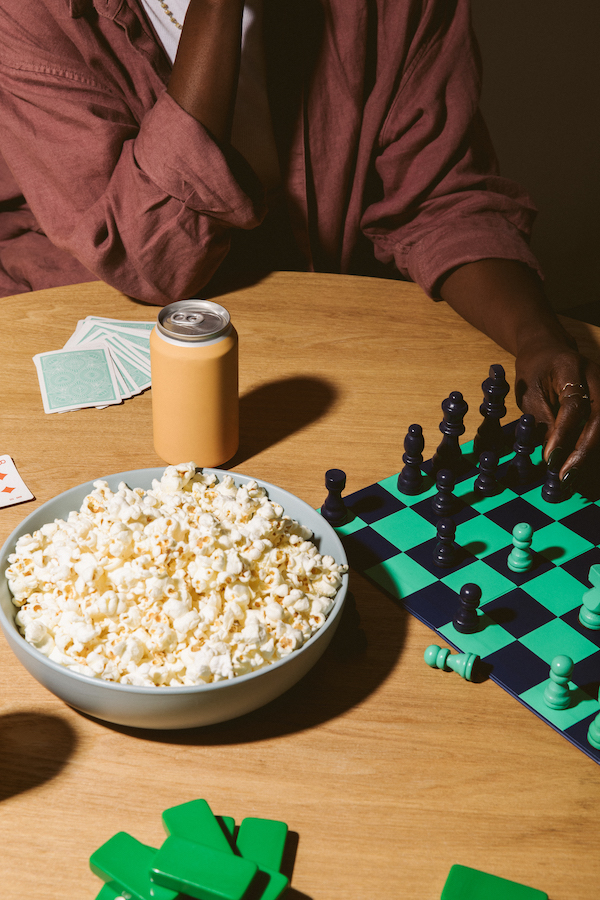
How To Cultivate Friendships Without “Going Out”
I handed my credit card to the waiter as a delightful dinner with two of my close friends concluded. The meal was nothing particularly extravagant, but dining out is always more costly than cooking at home, and this was the third time within a week that I found myself paying a financial price for some quality friend time.
As I looked across the table at the bowed heads of my friends scribbling tips onto their receipts, I was momentarily transported back in time to seeing those same heads bowed over a group project in high school. We saw each other for hours nearly every day when we were classmates. Nothing was formal or curated. The friendships were birthed through repetitive days, months, and years together within the simultaneously mundane and thrilling framework of teenage life.
“I would never have imagined that some of my closest friendships would one day be confined to a small blue rectangle on my Google calendar every other month.”
Spending time with friends used to be as free as it was frequent. From sitting next to each other in class to making friends at poorly paying first jobs and internships, there was a daily opportunity for connection that I naively took for granted. I would never have imagined that some of my closest friendships would one day be confined to a small blue rectangle on my Google calendar every other month. As the years have gone by, our paychecks and offices have grown while our capacity for regular informal connection has shrunk.
I’m tremendously grateful for the privilege of having a budget for friend dates, but the cost of brunch, dinner, and drinks (let alone bigger trips or weekends away) add up quickly for all parties involved. This can present relational challenges when friends are inevitably in different life stages with varying income levels and responsibilities. Finances aside, after a few years of meeting up every so often to swap stories over entrèes, it can begin to feel as though our adult relationships orbit primarily around discussing old memories rather than making new ones.
“While there’s nothing wrong with conversation over tasty food (two of my favorite things in life), the context does have its limits.”
While there’s nothing wrong with conversation over tasty food (two of my favorite things in life), the context does have its limits. I think there’s a reason that first dates typically start in these settings, and then stronger romantic relationships slowly shift into simply living life and doing chores together. It’s not because we like the person any less–quite the contrary! It’s because the intimacy of sharing everyday life is the ultimate trusting relational environment.
Ironically, friendships often reverse this trajectory. We make new friends in casual everyday settings such as high school or college, the workplace or gym. Then, once that contextual container dissolves, we tend to revert to the “first few dates” behavior. We text to coordinate a time and place, meet up to chat, split the bill, and go home to our real lives.
While there’s seemingly no escape from the logistical scheduling required to maintain adult friendships, I’m finding that time with friends in situations requiring no funding can generate stronger bonds. When we invest our energy, instead of our dollars, into tasks or activities with companions, a sort of magic unfolds.
“When we invest our energy, instead of our dollars, into tasks or activities with companions, a sort of magic unfolds.”
Most of my favorite memories with adult friends are the ones in which our real lives intersected without any glamor: helping a longtime bestie move into her first home, laughing alongside a girlfriend when my car broke down in the middle of a long drive-through vaccination line, realizing how little we knew about horticulture while volunteering together at a justice-centered local farm. Each of these situations alchemized from inconvenience or embarrassment into a cherished memory because of the friend who physically shared the moment with me. We created a new story together instead of simply swapping old ones.
The only way to create space for transforming the mundane into magic is to meet one another in the reality of everyday life. We make space for fresh perspectives when we bring others into our little world, and we learn more about theirs than we ever could by exchanging words or splitting tabs. In a digital era, this simple, tangible approach to friendship can feel challenging, but there are countless ways to integrate friends into your daily life.
Ways to actively spend time with friends at home:
- Make a meal you’ve never tried before– bonus points for doing dishes together.
- If you both work remotely, have a quiet “working date” in your living room and coordinate your break times for some literal or metaphorical tea.
- Plan a two-part cleaning swap. For example, they come to help you wash your windows one week, and you go to their house to help organize their pantry the next week.
- If there’s a holiday coming up, invite them over to make cards or wrap gifts with you.
- Work in the garden together or lay outside and read.
- Plan a free at-home spa day with a DIY facial steam and a YouTube yoga session.
- Make a few freezer meals together to prepare for any upcoming busy seasons.
- Clean out your closet – a friend can offer fresh perspectives on outfit combinations you wouldn’t have considered and help you decide what to say goodbye to.
- Have a “mending party” together and prolong the life of your clothes.
- Host a silly simple themed dinner that will cost next to nothing. (Our last one was quite literally just “potato.” Everyone brought a different potato dish to our house and presented it before we ate, no fancy decor, just a chance for people to get creative and laugh about something as simple as the versatility of a root vegetable.)
Here are some ideas that weave into the fabric of daily life (and get you out of the house!):
- Go on a hike or walk a local trail.
- Volunteer together for a local cause you both care about.
- Go grocery shopping for one or both of you.
- Take your dog(s) to the dog park together.
- Ask them to join in your errands and chat as you head to the dry cleaner, bank, etc.
- Sign up for a 5k together (or create your own!).
Will I continue to go out on the town with friends? Absolutely. Even couples who spend every day living together benefit tremendously from treating themselves to a special date night. I’m just not relying on that as the foundational or primary activity for my friendships. The more I trust my friends with access to my real life, the more they trust me with theirs, and that is more satisfying than any fancy dinner out.
Ellie Hughes spent several years as a sustainable fashion blogger and leading the marketing for brands aiming to operate with ethics and the environment as their priority. She is now a freelance writer and marketing consultant living in Portland with her husband, two young daughters, and corgi.




